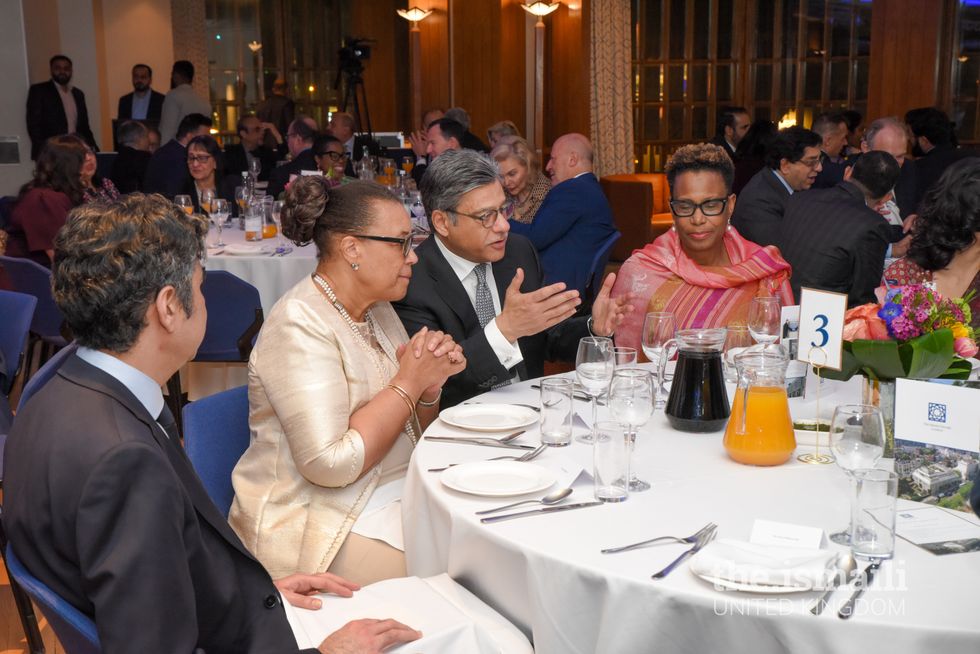THE outgoing head of the Commonwealth has paid tribute to the late Prince Karim Aga Khan, describing him as a visionary leader whose lifelong dedication to service, peace, and pluralism has left a lasting impact on the world.
Speaking at an Iftar dinner held at the Ismaili Centre in London last Wednesday (26), Baroness Patricia Scotland, who steps down as Commonwealth secretary general on 1 April, reflected on her personal connection with the Aga Khan, recalling their meetings during Commonwealth Day celebrations at Westminster Abbey.
The leader of Ismaili Muslims, Prince Karim Aga Khan, died in February at the age of 88 in Lisbon, Portugal. His charities ran hundreds of hospitals, educational and cultural projects, largely in the developing world.
“His grace and wisdom were always inspiring,” Baroness Scotland said during the event which was attended by around 180 guests. She praised his humility and kindness, recalling how he treated everyone with equal respect. “What was most remarkable, however, was that if you did not know who he was, you would never have realised. He treated every person as special, every person as important, and every person as worthy of his attention.”
The British politician described the Aga Khan’s leadership as one driven by duty rather than authority, and responsibility rather than power. She highlighted his unwavering belief in the transformative power of knowledge, faith, and unity, noting that his vision extended beyond his own community.
“His efforts to strengthen the Ismaili community, especially during the harrowing years of Idi Amin’s regime in Uganda, were a testament to his commitment to justice and human dignity,” she said. She also praised his broader contributions to society, through the Aga Khan Development Network (AKDN), which established schools, hospitals, cultural institutions, and economic initiatives that serve people of all backgrounds.
“He believed that faith should be a unifying force, not a dividing line, and that dialogue between peoples was the key to prosperity and peace,” she added.
Baroness Scotland also spoke about the transition within the Ismaili community, as Prince Rahim Aga Khan assumes leadership responsibilities. She compared this to the Commonwealth’s recent change following the passing of Queen Elizabeth II and the accession of King Charles III.
“Even in change, there is continuity,” she remarked, expressing confidence that the values championed by the late Aga Khan would continue to guide the Ismaili community.
The Iftar dinner brought together a diverse group of guests, including faith leaders, diplomats, and members of the Ismaili community.
Baroness Scotland said the event itself symbolised the power of interfaith unity. “Simply by looking at the people seated at your table, you can see the diversity that gives the world hope,” she remarked.
She also spoke about the importance of building bridges across faiths and nations. She commended the Commonwealth’s Faith in the Commonwealth programme, which promotes interfaith cooperation as a tool for development, reconciliation, and peacebuilding.
“In a world marked by uncertainty and division, we are reminded that peace is not merely the absence of conflict—it is the presence of justice, opportunity, and understanding,” she said.
As she steps down from her role, Baroness Scotland drew a parallel between her departure and the recent transitions experienced by both the Ismaili community and the Commonwealth.
Speaking during the event, Naushad Jivraj, president of the Ismaili Centre, paid tribute to the Ismaili community’s rich diversity and enduring values of good citizenship and voluntary service. “The traditions of the Ismaili community are rooted as much in our geographic, cultural, and ethnic diversity as in the inclusiveness of our multi-faith families,” he noted.
He reflected on the leadership and legacy of late Prince Karim Aga Khan IV, describing him as a champion of peace, pluralism, and human development. “His 67 years of leadership were marked by a profound commitment to the well-being of all peoples, Muslim and non-Muslim alike, and to values we all cherish: peace, pluralism, education, and service to humanity,” he said.
He praised the ongoing guidance of Prince Rahim Aga Khan, the 50th hereditary Imam, who continues to lead the community in addressing today’s challenges. “We look forward with confidence and commitment under the guidance of Prince Rahim Aga Khan, who continues an unbroken line of hereditary succession and leadership stretching back over 1,400 years,” Jivraj added.
Stressing the spirit of unity, Jivraj spoke of the power of communal gatherings during Ramadan. “The act of breaking bread together becomes a powerful expression of unity across faiths, cultures, and nations,” he said.
Jivraj also highlighted the Ismaili community’s unwavering belief in pluralism. “We believe resolutely in the power of pluralism—that there is beauty and strength in the coming together of people from different backgrounds, faiths, cultures, outlooks, and identities,” he said.
He pointed out the significance of Ramadan as a time for spiritual growth, community bonding, and generosity.
Participants at the event included Liberal Democrats leader Sir Ed Davey, equalities minister Seema Malhotra, MPs Munira Wilson, Rupa Huq, Lord Tariq Ahmad and Baroness Usha Prashar.




















Anurag Bajpayee's Gradiant: The water company tackling a global crisis